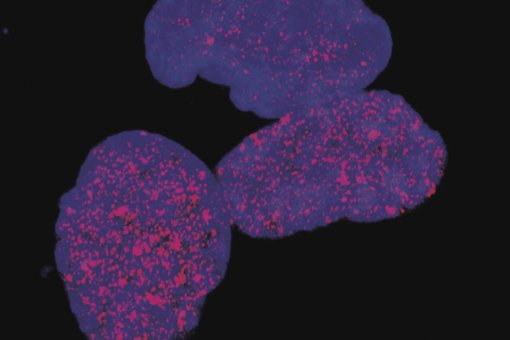Images
Contact

Tumour cell growth is limited to compartments by the action of two receptors that confine these spaces.
The first step in the development of colon cancer is the formation of benign tumours, called adenomas, in the intestine. Over time, these tumours may progress to produce colon cancer if they undergo a series of mutations and genetic alterations. Researchers at IRB Barcelona under the direction of Eduard Batlle, ICREA researcher and head of IRB Barcelona’s Oncology Programme, have discovered a new mechanism by which the benign tumour cells receive instructions to grow in confined compartments, and no to invade other areas of the tissue. The description of this new tumour suppression mechanism is reported in the scientific journal Nature Genetics.
The scientists observed that adenomatous tumour cells have special surface receptors, called EphB2 and EphB3, which detect the presence of certain ligands in the healthy tissue that surround them. These receptors and their ligands serve to organize the structure of intestinal tissue. Thanks to the activity of EphB2 and EphB3, the tumour cells are forced to "listen to" the signals that they receive from their environment. These signals make the benign tumours grow in a confined space, from which they are unable to spread. "We knew that these receptors worked as tumour suppressors, but we did not know how. Now we have been able to observe that they compartmentalize the tumour, thereby preventing its spread", explains Batlle.
Until the tumour cells learn to deactivate these receptors, they cannot invade other tissue outside the compartment. Batlle goes on to say, "as the tumour cells progress to become malignant, their genetic programme is refined and they remove the signals that block their growth, including these two receptors, which impose positional information".
This study explains one of the key mechanisms of how a benign tumour transforms into a malignant one during the onset of colon cancer. Using experiments performed with animal models and in vitro cells, the scientists determined that the loss of compartmentalization, that is to say, the loss-of-function of these two receptors, is one of the vital factors in the development of adenoma-derived colon cancer.
It is estimated that between 30 and 50% of people over 60 years of age may develop one of these benign adenomas. Cancer of the colon ranks first in the list of the most common cancers in Spain, with more than 25,000 causes diagnosed each year. Last year alone, more than half a million people worldwide died as a result of this disease.
Reference article:
EphB-ephrin-B interactions supress colorectal cancer progression by compartmentalizing tumor cells (2007)
Cortina C., Palomo-Ponce S., Iglesias M., Fernández-Masip J.L., Vivancos A., Whissel W., Humà M., Peiré N., Gallego L., Jonkheer S., Davy A., Lloreta J., Sancho E., Batlle E.
Nature Genetics (doi 10.1038/ng.2007.11)
About IRB Barcelona
The Institute for Research in Biomedicine (IRB Barcelona) pursues a society free of disease. To this end, it conducts multidisciplinary research of excellence to cure cancer and other diseases linked to ageing. It establishes technology transfer agreements with the pharmaceutical industry and major hospitals to bring research results closer to society, and organises a range of science outreach activities to engage the public in an open dialogue. IRB Barcelona is an international centre that hosts 400 researchers and more than 30 nationalities. Recognised as a Severo Ochoa Centre of Excellence since 2011, IRB Barcelona is a CERCA centre and member of the Barcelona Institute of Science and Technology (BIST).





